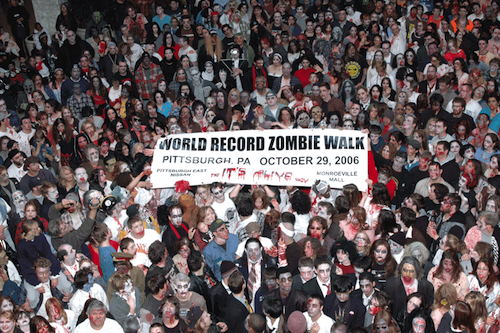 Culture & Ethics
Culture & Ethics
Do Transhumanists Want Realists Dead?

Transhumanists crack me up, but I also find them a bit unsettling. They claim the mantle of scientific rationalism. But they are really desperate to escape the reality of mortality, and so pretend that “the singularity” will save them.
It’s sad really, and the eugenics values of the movement can be dangerous. But sometimes, a transhumanist posts an article so steeped in fantasy, hyperbole, and wishing their detractors ill, that it just begs for a little poking.
One such article has been published over at Transhumanist Central (IEET), written by a professor (of course!), calling those of us who accept that death is — and always will be — a part of life with which we must grapple, “zombies.” From “We May Look Crazy to Them,but They Look Like Zombies to Us,” by Steve Fuller:
How are we to think about such beings who think this way? Aren’t they the living dead?
Indeed. These are people who live in the space of their largely self-imposed limitations, which function as a self-fulfilling prophecy. They are programmed for destruction — not genetically but intellectually.
Someone of a more dramatic turn of mind would say that they are suicide bombers trying to manufacture a climate of terror in humanity’s existential horizons. They roam the Earth as death-waiting-to-happen.
I have news for Fuller: I am genetically programmed for death, and so is he. I recognize that fact as a matter of seeing life clearly. That hardly makes me a “suicide bomber” of any stripe. Indeed, pretending otherwise is rank escapism, mostly embraced by those who lack the solace of traditional faith.
Fuller then gets to the zombie part, and seems to wish us “living dead,” to really die and get out of transhumanism’s way:
Zombies are normally seen as either externally revived corpses or bodies in a state between life and death — what Catholics call ‘purgatory’.
That’s not accurate, but I’ll let Catholics correct Fuller on the theology of purgatory. Back to Fuller:
In both cases, they remain on Earth beyond their will. So how does one deal with zombies, especially when they are the majority of the population?
There are three general options: 1) You kill them, once and for all. 2) You avoid them. 3) You enable them to be fully alive.
Yikes. Do transhumanists really want us realists dead?
I roll my eyes. But then, I recall that Zoltan Istvan, now on a presidential campaign swing in an old bus decorated to look like a coffin, has stated publicly that those who resist transhumanism should be defeated by any means, including war, if necessary.
Fuller also goes there:
The decision here is not as straightforward as it might seem because the prima facie easiest option (2) requires that there are no resource implications.
But of course, zombies require living humans (i.e. potential transhumans) in order to exist in the manner they do, which in turn makes the zombies dangerous; hence (1) has always proved such an attractive option for dealing with zombies.
After all, it is difficult to dedicate the resources needed to secure the transhumanist goal of indefinite longevity, if there are zombies trying to anchor your existential horizons in the present to make their own lives as easy as possible.
This brings to mind a speech I saw given by Aubrey de Grey, in which he said that failing to adequately fund anti-aging research was as much terrorism as blowing up a car bomb. As we saw above, Fuller seems to think so too.
Transhumanists want to divert scarce resources to tilt at their immortality windmills. We zombies can’t let it get to that potentiality. A good poking now and then is a splendid preventative.
But keep dreaming those immortality dreams, fellows. As the old song once put it, whatever gets you through the night.
Image credit: MissDeeCS, [CC BY-SA 2.5-2.0-1.0, GFDL or CC-BY-SA-3.0], via Wikimedia Commons.
